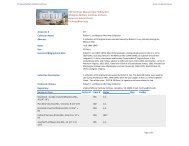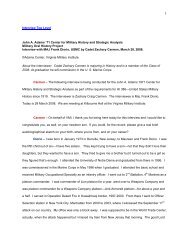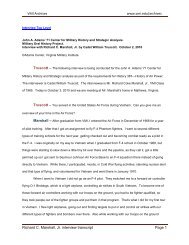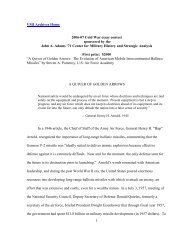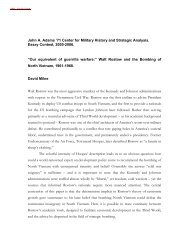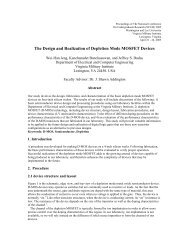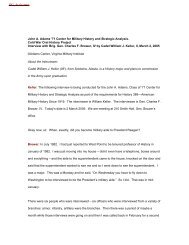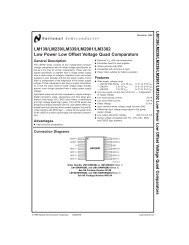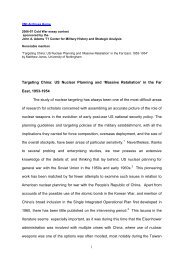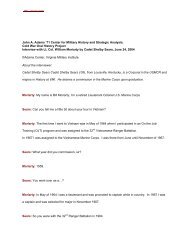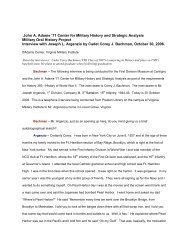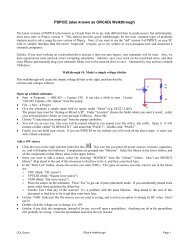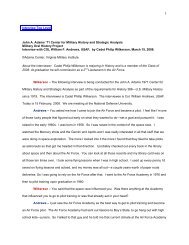Academic Catalog - Virginia Military Institute Admissions
Academic Catalog - Virginia Military Institute Admissions
Academic Catalog - Virginia Military Institute Admissions
You also want an ePaper? Increase the reach of your titles
YUMPU automatically turns print PDFs into web optimized ePapers that Google loves.
<strong>Virginia</strong> <strong>Military</strong> <strong>Institute</strong><br />
12-13 <strong>Catalog</strong>ue<br />
HNS. HONORS SEMINAR - SCIENCE/ENGINEERING 3—0—3<br />
These seminars provide exposure to topics in the sciences or engineering. One course in<br />
this sequence is required to earn <strong>Institute</strong> Honors. HNS seminars are writing intensive and<br />
are open to all majors. Topics vary by semester. Recent offerings include Environmental<br />
Myth, Ethics, and Justice and Science and Medicine: A Case-Based Approach. Prerequisite:<br />
Admission to the <strong>Institute</strong> Honors Program.<br />
HN 400-401. HONORS THESIS/PROJECT RESEARCH 3—0—3<br />
Research for and completion of the <strong>Institute</strong> Honors thesis under the guidance of a faculty<br />
adviser. Cadets may enroll in this course (for one semester or two) or another appropriate<br />
research or independent study course in order to earn credit for completing the thesis required<br />
for <strong>Institute</strong> Honors. Enrollment is restricted to cadets in the <strong>Institute</strong> Honors Program and<br />
requires permission of the director of the <strong>Institute</strong> Honors Program. See Colonel McDonald<br />
in the Dean’s Office for details.<br />
organizational structure of Congress (with an emphasis on the committee system), the<br />
legislative process, the Congress’ relationship with the President (especially on issues of<br />
national security), and electoral politics.<br />
IS 312. THE AMERICAN PRESIDENCY 3—0—3<br />
The American Presidency is a political institution like no other in the world. Born of the<br />
Founding Fathers’ wariness of the concentrated political power, the office is a blend of head<br />
of state, commander-in-chief, chief of party, and head of government. Its evolution has been<br />
central to the development of American national government and Americans’ concepts of<br />
and relationships to that government. This course will trace the history of the Presidency<br />
from the Founders’ ideas about and experiences with executive power to the office’s current<br />
state—with all its inherent paradoxes. I hope that, through this course, cadets will come to a<br />
deeper understanding of the Presidency’s origins, development, powers, and limitations as<br />
well as the reasons behind the constant contest between the President and the Congress.<br />
INTERNATIONAL STUDIES AND<br />
POLITICAL SCIENCE<br />
DEPARTMENT OF INTERNATIONAL STUDIES AND POLITICAL SCIENCE<br />
DEPARTMENT head: ColONEl HENTz<br />
Requirements for a degree in international studies and political science are specified on<br />
pages 60-61.<br />
IS 201. INTRODUCTION TO INTERNATIONAL STUDIES AND POLITICAL SCIENCE 3—0—3<br />
This team-taught course introduces students to political science as a discipline and to the<br />
different interests of the international studies faculty. It is divided into four sections covering<br />
political science, political theory, American politics, comparative politics, and international<br />
relations. Readings are taken from the classics in political science. The focus is on key<br />
concepts, such as power, state-society relations, institutions; and on the central debates<br />
across the discipline and within the sub-fields. Required for IS majors. Must be attempted<br />
in the 3rd class year. Open only to IS majors.<br />
IS 210. AMERICAN GOVERNMENT 3—0—3<br />
Examination of our main national governmental institutions and the application of<br />
constitutional provisions to their operation. The role of political parties, elections, and public<br />
opinion in the American political process.<br />
IS 220. INTERNATIONAL POLITICS 3—0—3<br />
Focuses on the international system of politics and examines the nature of relations between<br />
states, the factors which affect the actions and motives of states in their dealings with one<br />
another, and selected current problems in international politics.<br />
IS 230. COMPARATIVE POLITICS 3—0—3<br />
This introduction to the field of Comparative Politics has two main objectives. The first is to<br />
provide a foundation of basic empirical knowledge about political institutions and processes<br />
in select key countries: Britain, France, Germany, Japan, Russia, China, India, Iran, and<br />
Mexico. The second, more open-ended, objective is to engage some of the “big questions”<br />
and themes in world politics that engage scholars, political leaders, and (ideally) educated<br />
citizens: How and why did modern nation-states emerge in the West How do the legacies<br />
of colonialism and socialism influence political and economic development elsewhere<br />
What are the conditions most conducive to liberal democracy and market capitalism-and<br />
do they always go together<br />
IS 301. TECHNIQUES OF COMPUTER ANALYSIS 2—2—3<br />
A course to teach the fundamentals of computer analysis as practiced by students of<br />
international studies, historians, and political scientists. Emphasizes the active use of<br />
computers to perform statistical analysis on primary source data from a variety of contemporary<br />
and historical sources. Prerequisites: open only to international studies majors who have<br />
passed IS 201 with a grade of 75 or higher.<br />
IS 310. AMERICAN FOREIGN POLICY 3—0—3<br />
The central purpose of this course is to familiarize cadets with prevalent theoretical<br />
approaches to decision-making and to use these models to examine the American foreign<br />
policy experience. To this end, the course will survey rational, organizational, bureaucratic,<br />
and various psychological perspectives. Cadets will then use these tools to critically review<br />
the historical development of America’s relations with other international actors, including<br />
Washington’s admonition to steer clear of “foreign entanglements,” the world wars, the Cold<br />
War, and the current battle against terror. The course concludes with several mock policy<br />
debates which are designed to illustrate the intricacies of high-level decision-making and<br />
provide insights into the likely conduct of US foreign policy in the 21st Century.<br />
IS 311. THE AMERICAN CONGRESS 3—0—3<br />
In the Constitution, the article that describes the duties and functions of the Congress<br />
as well as its limitations is longest. The reason for this evident: the Founders considered<br />
that the Congress, as the body of government that would pass our laws and control the<br />
federal purse, would be at the center of national government and politics. Despite the<br />
Presidency’s rise in power and reputation, Congress’ powers ensure it will be at the center<br />
of our constitutional order. Subjects covered will include the ideas that influenced the<br />
Founders’ ideas of a federal legislature, the powers of the Congress, the leadership and<br />
96<br />
IS 320. NATIONAL SECURITY POLICY 3—0—3<br />
Consideration of the formulation and conduct of United States defense and foreign policy<br />
with special attention to the key institutions involved in the decision-making process in this<br />
field. Recommended for NROTC cadets.<br />
IS 321. INTERNATIONAL POLITICAL ECONOMY 3—0—3<br />
Provides students with a basic understanding of the nature and dynamics of contemporary<br />
international political economy (IPE). Politics and economics have often been separate fields<br />
of study with different core concepts. The former typically centers on power and the latter<br />
markets. However, the nature of international relations demands that we understand the<br />
interaction of politics (power) and economics (markets). This course will examine a broad range<br />
of substantive issues (trade relations, financial and monetary policy, economic integration,<br />
and economic development), as well as theoretical debates in IPE. Prerequisites: PO 325<br />
International Politics or PO 350 Comparative Politics.<br />
IS 322. INTELLIGENCE AND POLICY 3—0—3<br />
The history and practice of intelligence with special emphasis on the relationship to the<br />
political policy process. The focus is on the U.S. intelligence experience since WWII, although<br />
some attention is given to the broader comparative context.<br />
IS 323. THE UNITED STATES, PAKISTAN, AND AFGHANISTAN 3—0—3<br />
Cadets learn of historical factors and conflicts that have shaped the situation today with<br />
particular emphasis on the period from the start of extensive Soviet involvement in the 1970’s<br />
through the resurgence of the Taliban in the mid-2000s. They track political and military<br />
developments relying on a variety of news and think tank sources and examine various options<br />
for resolving the conflict from the US perspective. They make a field trip to Washington.<br />
IS 325X: THE UNITED STATES AND IRAN 3—0—3<br />
This civilizations and cultures designated course focuses on the modern history of Iran and<br />
its relationship with the US. Cadets analyze policy options for addressing various challenges<br />
that Iran – especially if it gains a nuclear weapons – presents to the region, to the US and<br />
the world. Cadets make a field trip to Washington to speak with experts in think tanks and<br />
to examine Iranian cultural artifacts at the Smithsonian Museum.<br />
IS 329. Counterinsurgency 3—0—3<br />
This course will concentrate on: a study of select counterinsurgencies using historical<br />
pattern analysis. Instructor will present a selection of various insurgencies and students will<br />
research and present on the following topics: American Revolution: Colonial insurgents against<br />
British army; Insurgency and Guerrilla warfare in U.S. Civil War; U.S and Counterinsurgency<br />
in the Philippines, 1899-1902; The Boer War: The Second War (1899-1902); British Malayan<br />
Emergency (1948-1960); Irish Republican Army vs British Army; Nepal : Maoist Insurgency.<br />
(1996-present); Colombia : FARC insurgency; and Overview of Turkish/Kurdish insurgency<br />
problem. Using historical study and pattern analysis of insurgent and counterinsurgent<br />
strategies, upon completion of the class, we will hopefully have an answer for the question<br />
– Will current U.S. counterinsurgency strategies in Afghanistan work<br />
IS 330. POLITICS IN WESTERN EUROPE 3—0—3<br />
An examination of the political systems and the domestic, foreign and defense policies<br />
of the United Kingdom, France, Germany, selected smaller Western European nations, and<br />
Canada. Attention will be paid to the new role of NATO, European unification, and the ways<br />
in which Western Europe and Canada deal with the United States.<br />
IS 331. POLITICS IN RUSSIA AND EASTERN EUROPE 3—0—3<br />
An examination of the political systems and the domestic, foreign and defense policies of<br />
Russia and the nations of the former Soviet Union and Eastern Europe. Attention is given<br />
to the consequences of Marxist-Leninist theory and to the problems of transforming former<br />
communist systems.<br />
IS 332X. POLITICS IN EAST ASIA 3—0—3<br />
An examination of the political systems and foreign relations of Japan, China, Korea,<br />
and Taiwan. Emphasis is placed on relations with other nations in the region, and with the<br />
United States. Particular attention is paid to the growing importance these nations have in<br />
the international economic system. Civilizations and Cultures designation.<br />
IS 333. POLITICS IN SOUTHEAST ASIA 3—0—3<br />
An examination of the political systems and the domestic, foreign and defense policies<br />
of the countries of Southeast Asia including: Brunei, Burma, Cambodia, Indonesia, Laos,<br />
Malaysia, Philippines, Singapore, Thailand, and Vietnam. The course also focuses on the<br />
role of ASEAN, the Association of Southeast Asian Nations and the impact of outside<br />
powers on the region.




